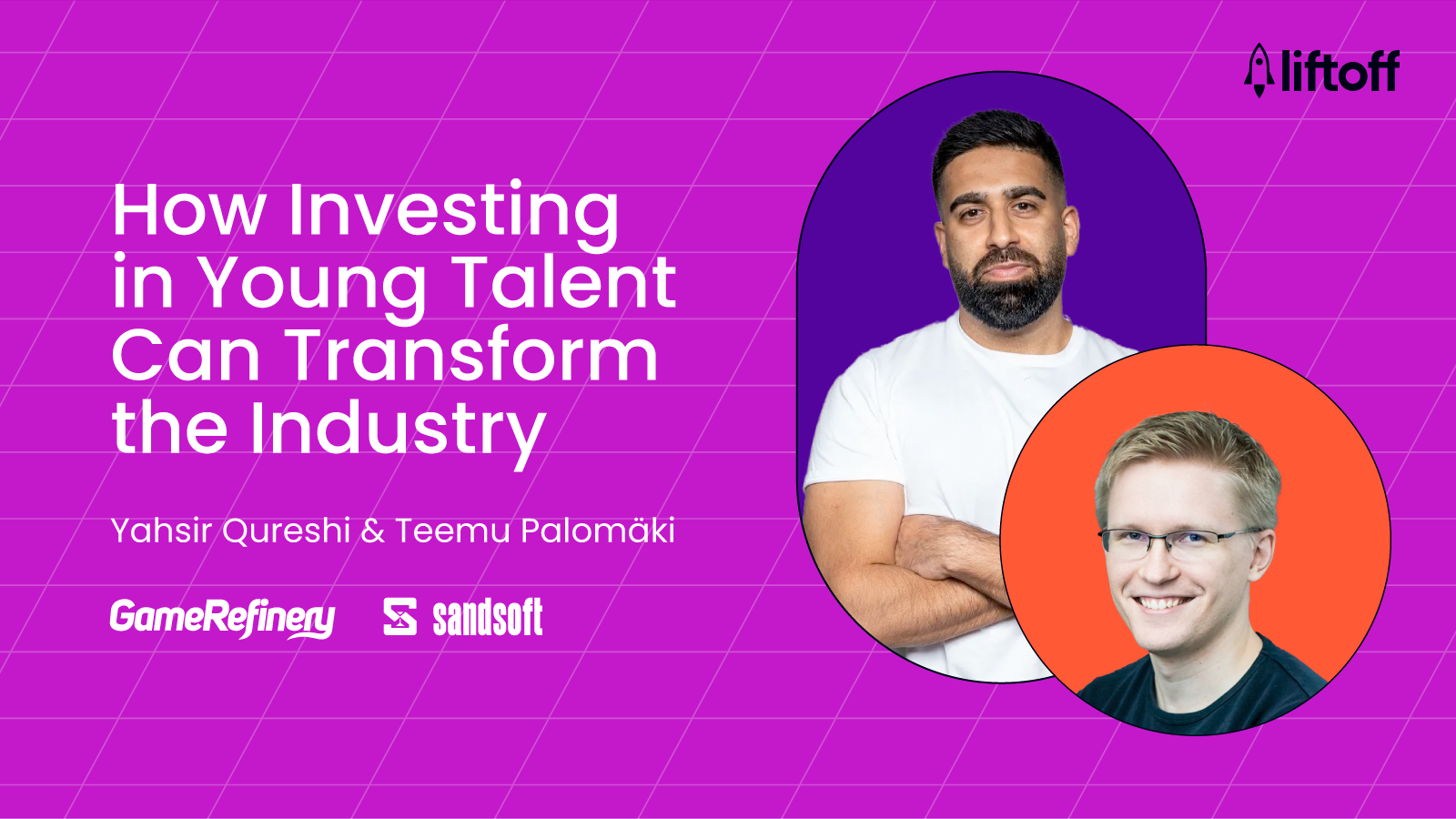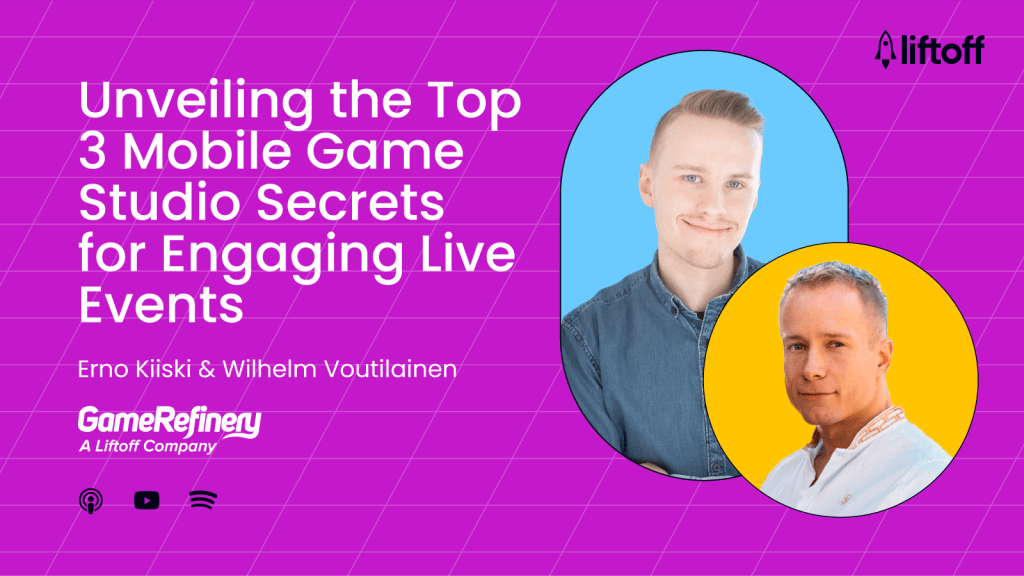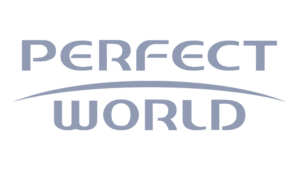Say farewell to The Mobile GameDev Playbook, as we introduce the new and improved Mobile Games Playbook, brought to you by Liftoff.
![]()
![]() Spotify, BuzzSprout, TuneInRadio, iHeartRadio
Spotify, BuzzSprout, TuneInRadio, iHeartRadio
– If you enjoy the episode, remember to hit subscribe!
Investing in young talent is crucial for the growth and development of the game development industry because it brings fresh perspectives, new ideas, and diverse backgrounds to the industry, which is vital to safeguard the future of game development.
Join us as we delve deeper into why nurturing and investing in young people is essential and how it can benefit the industry in the long run.
In this episode, we talk to Yahsir Qureshi, the VP and Head of Studio at Sandsoft Games and Chief Game Analyst at GameRefinery, a Liftoff Company, Teemu Palomäki. We look at Sandsoft’s “Press Start” program, a six-month initiative that addresses the skills gap in the game development industry. We examine the selection process for young developers and the resources they receive during the program and explore the expectations and outcomes of the program.
You can also watch the episode on YouTube:
Topics we will cover in this episode:
- Introduction
- Sandsoft Games
- Press Start program
- Is the mobile game industry good at bringing new talent on?
- Importance of understanding the complexity of game design
- The future of the Press Start program
- Building teams based on autonomy and freedom
- Embracing failure and the research and development nature of the industry
- Feedback and reception of newbie developers in the studio
Read transcript
Introduction
[00:00:00] Jon Jordan: Hello, and welcome to the Mobile Games Playbook. Thanks for tuning in for another episode. This is a podcast all about what makes a great mobile game, what is and isn’t working for mobile game designers and all of the latest trends. I’m your host Jon Jordan and joining me today, we have Yahsir Qureshi, who is the VP Head of Studios at Sandsoft Games. How’s it going, Yahsir?
[00:00:26] Yahsir Qureshi: Hello. Hello. Very good to be here.
[00:00:28] Jon: Good to have you on the podcast. We also have Teemu Palomäki, Chief Game Analyst at GameRefinery. How’s it going, Teemu?
[00:00:35] Teemu Palomäki: Doing great. Great to be here.[00:00:36] Jon: Good, it’s good to have you back. In today’s episode, we are going to talk, generally looking about bringing new talent into the industry and specifically about some of the stuff that Sandsoft Games is doing, but maybe Yahsir, to start us off, maybe if you give us a brief introduction about Sandsoft Games for people who haven’t heard of you yet, that might be a good starting point, and then we’ll kick into Press Start, your initiative.
Sandsoft Games
[00:00:59] Yahsir: Fantastic. Of course. As you introduced me, my name’s Yahsir. I’m the Head of the Studio here at Sandsoft Games. I’ve been in the industry for about 14, or 15 years now. [I’ve had] various roles at EA, on FIFA, at Zynga at CSR, and Dawn of Titans, and Need for Speed back in the days. I’ve had my fair share of experience across console and also mobile development. Sandsoft Games is a really interesting company. We started off probably about three or so years ago with different guys. We are owned by a Saudi Arabian-based company called Ajlan & Brothers, which is one of the most successful private-run family businesses in the Middle East. They essentially wanted to capitalize on the new vision of 2030, and that meant getting into gaming for them.
As you’ve seen, there’s been a massive investment in the region. Most recently, you’ve seen and heard of a lot of acquisitions happening as well. Beyond that, the government has really invested here quite heavily to the tune of about $38 billion that has been committed to gaming just over the next three or four years. Sandsoft strategy as a part of that is threefold. Firstly, it’s to develop studios. We have a studio that will be opening up in Europe, hopefully by around June time this year. We have a studio that we’ve just opened up here in Riyadh at the beginning of the year, and we are heavily recruiting for that.
Then we also publish games, and we’ve published several different games as well. We originally started off with a couple of licensed IP products with Rambo Strike Force and Pacific Rim, and now we’ve also moved on to publishing international games as well. We recently published Dodreams, Drive Ahead, as well for the Middle East Legion 2, that’s got about 200 million downloads so far, and we’re doing many other things as well that are going to be going up in the year.
Then the final pillar is that we also invest. We invest in game studios and also into games as well. Most recently we just invested in a game studio out in the south of France called Tiny Digital Factory, which focuses a little bit more on NFTs and is known for a couple of racing games, one being Duty Manager and then the other one being Infinite Drive, which is launched this year as well. We do a lot of things, but we’re really into gaming full stop.
The final distinction that I would make is that while we are headquartered in Saudi Arabia, we have international offices, and we’re a worldwide gaming company. We aren’t making games for the Middle East region necessarily, we’re focused on games for everyone.
[00:03:28] Jon: It’s interesting you mentioned that. I think that was something that a few years ago was the first stage of people in that region. It was to develop games for that audience, and I guess that got them to a certain level of development, but now that seems to be removed, and now all the companies in that region are now much more internationally focused And there’s much less focus on specific regional content because obviously, that’s a very small market. Anyway, so you guys are super busy, it sounds like you’re doing everything, really.
Let’s talk a little bit about Press Start. I guess this comes from, that there have been game developers in that region, but I guess up to this point, it’s been maybe slightly ad hoc, so entrepreneurs have started stuff up but didn’t seem like there’s necessarily been a strong focus on that. I guess when you’re trying to build big companies, and I guess you’re trying to build a big company there, you just don’t have senior people in the region because the industry hasn’t been around for that long in there, I suppose, to build up a big company. Is that where Press Start comes from, or is there something else going on there?
Press Start program
[00:04:35] Yahsir: Yes, so a lot of things to wrap there. Saudi Arabia, while it has the ambition and it has definitely the resources to build things at scale, as you alluded to it as well, it doesn’t quite have that established developed talent base because this hasn’t been an industry here at all, so it’s in its very infancy stages as well. Our strategy for that was to essentially try and understand how we can help develop the talent within the region, but at the same time also knowing that we’re a commercially minded company and we’re looking to make games for people all around the world, how do we best achieve that?
When we sat down, and we thought about this, one of the key insights that I really formed the program around when we were pitching it internally was that we didn’t want to just have an intern program. We didn’t want to have something where you could come and shadow somebody who would be brought in from another part of the world, who’s got 10, 15 years experience, and you can see what they do. For us, it was about making games developers, and there’s this adage that you learn from 20% of what you hear, 30% of what you see, but 80% of what you experience, and so what we wanted to do was to push people into the deep end.
We always assess people on passion and potential, and we went through a heavy recruitment process to figure out how many people out there we felt we could bring in for this first program. We recruited eight people into the program, a mix of designers, artists, and programmers, and we essentially said to them, “You have one mission, which is you have six months. You have all the resources that we can provide. You’ve got a lot of the experience from the team that already exists here at Sandsoft, but your mission is to create one game at the end of that six months.”
Learning by doing, learning by working within that small team environment, which is something that we pride ourselves on in terms of the culture of the studio that we have as well. That all was really important for us, for them to get to know how to make games in the style that we like, so working with small, nimble teams and scaling from there. Then also for them to learn about how to work in a professional games company, professional games environment, learn how to communicate, talk with each other, and share all these ideas as well. It’s really a baptism by fire, but it definitely feels like it’s the best way to learn as opposed to necessarily just sitting on short-training courses and so on as well.
The other thing I would add is that it was very important for us to assess people’s passion by what they’ve already been doing. It’s amazing because, as you said, most people in this region, certainly in this country, haven’t had the opportunity to work at a games company yet that hasn’t stopped them from working on games. Everybody that we have on the program currently has already shaped a game themselves, whether it be on Steam, whether it be on mobile.
These are people who are studying or maybe have a job, and a hobbyist or doing things with friends. When you have that appetite and that energy, where people are eliminating any chance of an excuse to say, “Hey, this is why we can’t do it,” instead they’re focusing on the reasons they can, it makes you want to work with them even more and understand what potential they could fulfil if they had the right resources around them.[00:07:50] Jon: Yes, I guess it’s also very important that it’s not just a program where people do some learning or something like that; they have to create something. There’s a focus on, “You’ve got this six-month period; at the end of it, everyone in the company’s going to sit down and play your game, and it’s going to be pretty embarrassing if that’s not quite what you want it to be.”
That’s quite a good incentive, isn’t it? Teemu, obviously, you’re not running a similar program like that, but you are involved in having involved as a game developer doing this, do you think the industry, more generally, is good at bringing people on?
Is the mobile game industry good at bringing new talent on?
[00:08:26] Teemu: It depends on location, of course. For me, my way of coming to the game industry was through studying it. I was studying in Kajaani in Finland, and the school there had basically a similar system that you are actually making games, you’re focusing on creating games, and learning by experience, where 80% of the learning comes, as Yahsir said. I’ve experienced this kind of system at a lower level. There wasn’t a business aspect related to it, but it really works, and creating this opportunity for people is really beneficial.The fact that they have the resources, they had the passion for creating something on their own time, but now having the resources to actually create something and get the help to things that they might have been lacking before, that’s definitely a boost, and it will most certainly help the game development in the region for sure. I wish these kinds of programs were more common.
I’ve seen in Finland, Supercell was making the Hive Programming School, that’s a school aspect, not a training for the company per se, but there is also peer-to-peer learning and industry experts giving resources and help, and many Finnish companies are then picking the best from there when they train to their specific needs. This is definitely something that is really good for the industry.
Importance of understanding the complexity of game design
[00:10:28] Jon: It’s something that we’ve really seen you over the years. It becomes easier for people to make games, certain things like Roblox and obviously mobile. It’s a very open thing. The interesting bit, and maybe we don’t use any more game developers per se, I don’t know. But the interesting bit is getting the professionalisation right. Anyone can put together something but learning the very difficult bit, I suppose is not necessarily the business side but learning exactly what level you have to operate at in order to have a product that can be seen as being a professional business product that can be taken seriously.
That’s particularly something that you guys are doing with Press Start because you’re embedded in that industry. That takes it to the next level.
[00:11:14] Yahsir: Yes. I think you pick up on some really, really good points there, which is the majority of the time, when people begin to make games themselves, they make games that they want to play. Usually, the problem is not many other people want to play them. You end up with a very indie outlook. Sometimes it can be very culturally relevant, sometimes, it can be just a purely personal project. Part of what we’re trying to do is inject more of that commercial lens. You can say, that’s a dirty word for a lot of purist game designers, but I mean it more in the sense that you want to make games that people will play. You want as many people to play your games as possible.
You have to almost disassociate it as away from just being your own project to now thinking about what’s relevant in the market and what type of audiences you want to attract. How do they play? How does that help inform your decisions? How do you remove as much of that individual subjectivity, which you do need at certain points, obviously, otherwise, there’d just be robots making these games. How do you manage that with all of the other considerations that you need to take into account?
It’s very clear that already on the program, we’ve had the people on it for about three months or so now that their mindsets have shifted very much from when they first came in wanting to develop their own game ideas to now realizing while it’s not just me working by myself, I’m working within a team, but also then I’ve got to find a right fit for this game that I’m making. I can’t just make it for my friends and me as well. They’re learning very quickly, and they’re learning by doing, which is ultimately one of our key aims with this program is to make sure that by the end of it, they can look back and say, I would’ve changed X, Y, and Z knowing what I know now as well. It’s a really important part of the learning process.[00:13:05] Jon: The moment you’ve done the first one halfway through and you say to six or seven people, I think that’s so obvious, that’s great for those people. Does this thing stay that small? Does it scale up? The overall broad plans for what there’s obvious of a wider vision. Is it 2030 vision for Saudi Arabia is over the entire country, but I guess big scale is something that they’re quite keen on. How quickly does this scale up? Can it be used by other companies? It’s quite difficult to say that, maybe because you’re in the very early stages of it.
The future of the Press Start program
[00:13:48] Yahsir: It’s something that we thought about absolutely. Our ambition for us Riyadh Studios is to grow to about a hundred or so people by the end of next year. We’re recruiting quite heavily, there are other studios that have been popping up in the region as well, certainly within Saudi Arabia. They’re employing their own methods of scaling up the population. It’s an interesting question because in the country at the minute, you have a lot of government agencies who are enabling a lot of courses.
You’ve got game founders, you’ve got the Ministry of Communication and IT, which is running lots of certification courses with Unity, with Unreal. A lot of this stuff is happening at that scale, but that’s mostly teaching people the basics, getting them up to speed. It’s the challenge they have is that you have these hundreds of thousands of people that have gone through these programs, where are they going to go and work? What we decided was that for us, it made the most sense to start off on this basis. Then our goal with this program is to have two or three of these running potentially by next year at the same time. There’s no reason for us to just have it restricted to one.
It’s also a really good way for people on the program to identify what type of role they would want to really be in because they might think that they want to be a designer when they’re coming in, but then realize actually they’re probably better suited towards art or also programming or something else. We are able to scale but only up to a certain extent. There’s enough initiative going on with the rest of the country that I feel a lot of the standards within gaming will increase quite a bit.
There are lots of internal targets as well for the government in terms of what they’ve set in terms of the number of native game companies that they want to start. I think it’s about 150 of those by the end of next year that they want to try and encourage. There are things that are going on at scale across the entire Saudi Arabian Peninsula. For us, it was about quality over quantity and giving people the experience that we knew they could learn from but at a scale that would make sense. We are just using a lot of our own game development philosophies to apply that to the team as well.
Building teams based on autonomy and freedom
[00:15:59] Jon: I think, as you say, it’s already reminded me then when you’re talking about it, I used to be involved with some student projects very similar to that. It is interesting because everyone plays games now, everyone will go and work in the games industry, that’ll be brilliant. Everyone wants to be a game designer now because, of course. That’s like being the centre forward in soccer, isn’t it? It’s the high profile role, but then you get into this section, and you realize actually what a game designer does and how it’s really hard and making a good game isn’t just like, well, let’s just add some more guns or a bigger boss or something.
There’s actually the subtlety of doing it.
I think that what you’re doing with Press Start is interesting because that’s the eye-opening bit where people will go from you, and you need them to have the enthusiasm. You need to have, like, a love for games. Wouldn’t it be great to be involved in making games but then also to understand, these could be games, some games involved hundreds of people working for five years. This is not a back-of-an-envelope type of stuff to make a really high-quality game now. That’s the interesting dynamic that’s going on.
[00:17:01] Yahsir: Maybe I’m going off on a bit of a tangent…
[00:17:06] Jon: We like tangents. That’s good.
[00:17:09] Yahsir: I think it all comes down to a couple of questions or a couple of insights that we looked at when we first decided to really build a studio. I’ve been around the block enough to see what works and what doesn’t. It really came down to me to like two things. The first one was that 95% of mobile games commercially fail. That was the first insight that was clear. Secondly, I don’t think there’s anybody in this industry that has more than a 10% success rate at best with the games they release. We looked at those two insights, and we said, experience helps, but it’s no guarantee of success. Far be it, so from us, it wouldn’t be right to employ some chief product officer or creative director and have that as a bottleneck.
Usually, in my experience in those types of roles, people have made their reputation in one or two genres or focus on one or two titles, and beyond that, there’s a limited value that they can really add. If you’ve been working on match three your whole life and now you’ve got an RPG game in your portfolio, it’s a little bit difficult. From our perspective, the way that we’ve organized a lot of our development teams is in that mode of what we call tribes, which is similar to what you were alluding to as some of the things that sort Supercell are doing. We felt like that was the right way to go. We give those teams complete freedom and autonomy so they can kill whatever idea they’re working on.
They can start up a new idea if they want. There is nobody in the company from a CEO level, from my level, who can come in and say, you’re not going to make that game. You’re going to make something else. As much as we might have had past success, there’s no guarantee of anything successful in the future. We applied that same mentality to this group, which was you get to choose what you want to make. You’ll have to do your research and do all the other things as well, but ultimately we want you to work in the same format as we would have anybody else work.
Now, one of the interesting things that we did was that we sat down with the team when they first joined, and we all watched the Golden Eye documentary that was released, and it was earlier this year. It was to really give them more confidence because when you think back to the team that created that game, none of them had any experience in gaming. They hadn’t shipped a game before. It was a game which they were just thrown to rather than a game that anybody really wanted to work on. You see what they’ve managed to accomplish with that as well.
It’s more about resetting their expectations of what to expect from themselves and not just thinking that they’re going to release a hyper casual game in six months but rather to say, “You can do what you want, and you’ve got no excuses as well because everything’s available online. You can find what you want, you can learn skills as well. It’s really down to you as individuals wanting to really push yourselves as well.” That’s also where you find really good. People who are willing to push the envelope and really try and maximize their own potential as well.
[00:20:09] Jon: Go on Teemu.
[00:20:12] Teemu: Yes. Just thinking, when people are given their freedom to try out things, do their research, try maybe something a little bit unconventional, that’s where lots of great ideas come in. That’s why some Indie games are really popular, and on mobile games, the recent trend we’ve had of the mini-games popping up it’s because they have been really popular, like small-scale projects and in the hyper-casual space where people have tried different things. That has also bled into advertising, mobile advertising, and fake ads.
Those have been coming to the bigger games than as well as site modes or events or these mini-game modes. Small teams can really bring new innovations to a bigger picture as well for bigger companies, even if they make it in their smaller team.
Embracing failure and the research and development nature of the industry
[00:21:21] Jon: In general, as we’ve seen with hyper-casual, these new subgenres, they’re always very exciting, to begin with. Then they become, everyone works at the equilibrium, so you just end up where everyone’s doing it, and then it saturates and then, but the engineering of it is quite interesting. It stands out. They don’t know how much you do this, but it is interesting to have people not be working on the same game at the same scale all the time because that’s what burns people out. When you move between smaller things and then bigger things, bigger projects, that allows people to learn different ways of doing things.
There have been people on the console side of things which basically work for 10 years for a game that gets cancelled before it comes out. Then there are only so many games you get to make in your life. The nice thing about mobile is there is that movement, and you can move in and out of different projects. As you say here, it’s not anyone’s fault that mobile games fail. It’s just that’s baked into the industry isn’t; some games fail for bad decision-making, but most of them just fail all because that’s the way we are.
[00:22:27] Yahsir: Ultimately, all we’re doing in the games industry is research and development. Until you find something that resonates on a scale that makes it worthwhile working on, all you’re doing is research and development, and it’s akin to the pharmaceutical industry. You may have all the intentions to create a drug that solves cancer, but the likelihood of that is very small. Along the way, you have progress. You might find different things that you didn’t expect. It’s getting the Press Start team, getting all of our developers engaged in that mindset, and also knowing that they have the psychological safety to be able to do that.
That we’re not sitting here expecting success from products one, two, or three at all. In fact, we expect 75% of what we are going to be working on for the next couple of years to not be commercially viable. The question is, are you making progress in getting to what it is that could possibly resonate during that time? We don’t want to be following trends. If you’re following trends by definition, you’re always behind. If you’ve got a six-month runway to get something out by that time, the market’s flooded with hybrid casual, whatever you want to call the latest trend as well titles.
It’s interesting because people work in different ways. Some people really like restraints, and other people like a lot of freedom. Once you have a good group of people together who can respect each other, who can trust each other’s capabilities, and buy on that thing that I mentioned at the beginning which is that nobody has the right answer. You can’t come in with this attitude that this worked for me in the past it will work in the future. No, you’ve got to be humble enough to know set your ego aside and know that this is a journey of discovery, and all you’re doing is research and development.
You will expect things to fail, that’s what you should be doing, but out of it, you should be getting learnings and working towards something as well. This is a great program we’ve found for really ingraining that in the people that we’ve got on it as well.
Feedback and reception of newbie developers in the studio
[00:24:32] Jon: Has there been any feedback from the professional developers working there? I’m sure they’re all really lovely people, but you don’t always want newbies just flowing in. That can be disruptive, maybe for other teams, or have they found it quite inspiring that get these new people in?
[00:24:49] Yahsir: Yes. It’s not been something that’s been disruptive because our entire recruitment philosophy is centered around that idea that if you have an ego, if you come to us and say, “Look, I really want to make this game, and I just need some people to do it.” This is not the place. We’re not running a one-man shop or one-woman shop where you’ve got an idea, and then we’ll just instantly finance it. For us, it’s coming to this with the right mindset. Everybody that we’ve got on the team on the development team is fully appreciative of that. It starts from the top down, obviously as well.
We haven’t had any resistance towards it at all. It’s been the other way around. It’s been very interesting for other people to see how talented some of the people really are despite some of the obstacles they may have had. I don’t know about you guys, but I’m fairly sure when you find people that have that passion, that have that potential, you want to work with them, you want to inspire them. I always say as well when you’re first joining a company, and you don’t have any experience whatsoever, there’s not much you can bring to the table other than that passion. Maybe you’ve been working for 10, 15, or 20 years and are maybe a little bit more jaded and perhaps have some scars.
Then you’ve got all of this youthful enthusiasm coming in, which is injecting some level of hope or whatever it is. It’s really important that anybody coming in has that in order to drive things forward as well. More importantly, to help challenge convention. One thing that we absolutely ban in the studio is, oh, I tried that before it didn’t work. It’s like, no, no, no, that’s the easiest way to kill something that could work in the future. Having a lot of people who aren’t used to traditional development practices who haven’t been in that environment, they ask questions which most other people take for granted and never ask.
In that way, it’s a very egalitarian way to work where everybody sitting around the table has the same level of input. Nobody’s more important than anybody else. Of course, you can’t make every decision by committee. You do have to have leaders in place that will drive things forward. That’s what leadership’s really there for. For us, it’s to help drive things forward rather than to tell people what to do. We make that very clear. Everybody who’s part of the company is reporting on that from the very beginning.
[00:27:16] Jon: Cool. Very good. Well, thank you very much for giving us an insight into what you guys are doing at Sandsoft. Thank you, Teemu as well, for your insight. Thank you to you guys for listening to and watching the podcast; however, you are consuming it. Please subscribe. Every episode, we are talking to people in the mobile game space who are building out this incredible industry and are always dynamic, always new things changing, new games, and new ways of working. Please subscribe, and we will see you next time. Goodbye.




















